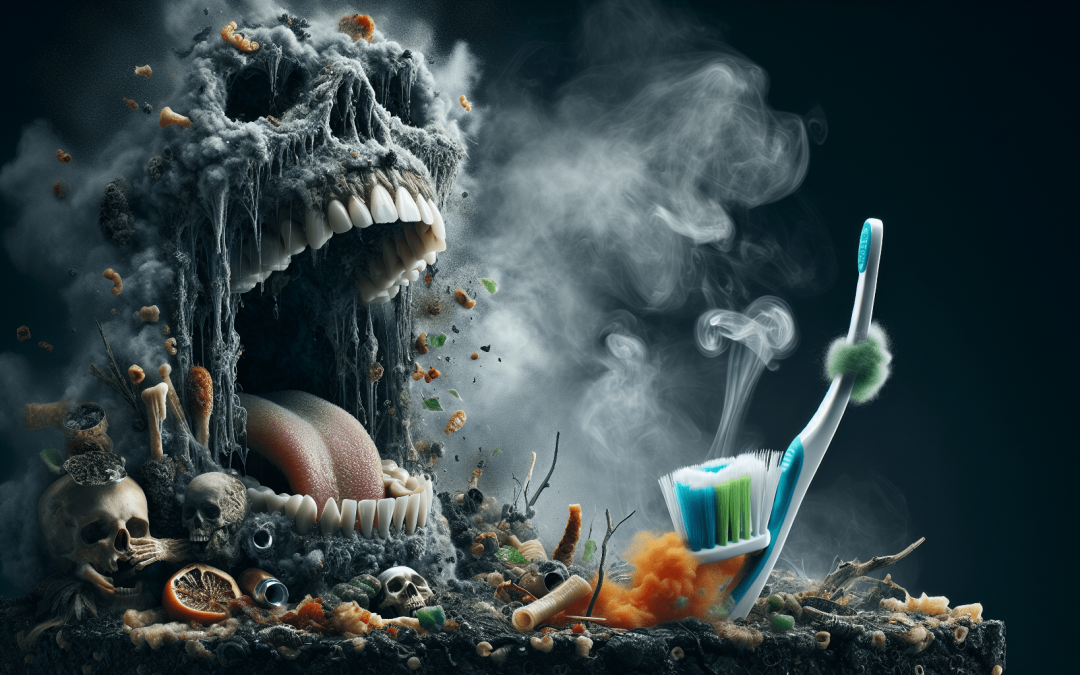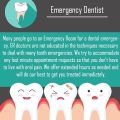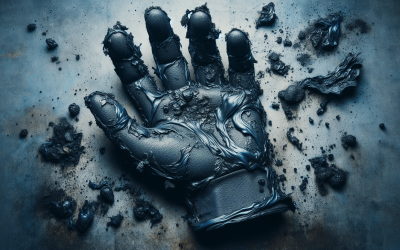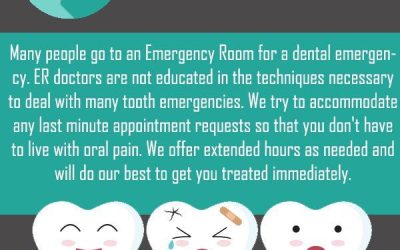Alright, so let’s talk about a rather sensitive topic: severe halitosis, also known as bad breath. We’ve all experienced it at some point, whether it’s the aftermath of a garlic-loaded meal or the morning breath that greets us in the mirror. But what happens when bad breath becomes a persistent issue that just won’t go away? In this article, we’ll explore the causes, symptoms, and possible treatment options for severe halitosis, because let’s face it, nobody wants to be known as the one with the perpetually unpleasant aroma. So buckle up and let’s find some solutions together!
Causes
Poor oral hygiene
Poor oral hygiene is one of the most common causes of severe halitosis. When you don’t take proper care of your teeth and gums, food particles remain trapped between your teeth and bacteria begin to break them down, releasing foul-smelling gases. Brushing your teeth at least twice a day and flossing daily are crucial steps in maintaining good oral hygiene and preventing bad breath.
Certain foods and drinks
Some foods and drinks can leave a lingering odor in your mouth even after you’ve consumed them. Garlic, onions, and strong spices are known culprits that can cause temporary bad breath. Additionally, beverages such as coffee and alcohol can also contribute to foul-smelling breath due to their strong aromas.
Tobacco use
Smoking or using other tobacco products can lead to chronic bad breath. Tobacco not only leaves a strong odor in your mouth but also dries out your mouth and increases the risk of gum disease, both of which can contribute to halitosis. Quitting tobacco use is not only beneficial for your overall health but also for combating bad breath.
Dry mouth
Dry mouth, also known as xerostomia, can be caused by various factors, including medications, certain medical conditions, and breathing through your mouth. Saliva plays a crucial role in maintaining oral health by rinsing away food particles and neutralizing acids. When there is a decrease in saliva production, it can lead to a build-up of bacteria in your mouth, resulting in bad breath.
Medical conditions
In some cases, severe halitosis may be a symptom of an underlying medical condition. Respiratory infections, sinusitis, tonsil stones, gastroesophageal reflux disease (GERD), and liver or kidney problems can all contribute to persistent bad breath. If you have chronic bad breath accompanied by other symptoms, it’s important to consult a healthcare professional for a proper diagnosis.
Symptoms
Persistent bad breath
Persistent bad breath, despite regular brushing and oral hygiene practices, is a key symptom of severe halitosis. This odor can be present throughout the day and may be difficult to get rid of, even temporarily.
Bad taste in mouth
Along with bad breath, you may also experience a lingering bad taste in your mouth. This taste can be described as unpleasant, metallic, or sour.
Dryness or thick saliva
Dry mouth is a common symptom of severe halitosis. You may feel a constant dryness in your mouth, which can lead to discomfort and increased bacterial growth. In addition, the saliva in your mouth may become thick and sticky.
White or yellow coating on tongue
A white or yellow coating on the back of your tongue can indicate the presence of bacteria, dead cells, and food debris. This coating is not only a potential cause of bad breath, but it can also contribute to an unpleasant taste in your mouth.
Postnasal drip
Postnasal drip occurs when excess mucus from your nose or sinuses drips down the back of your throat. This can result in a foul-smelling breath as the mucus combines with oral bacteria.
Diagnosis
Medical history and examination
A healthcare professional will begin the diagnosis by reviewing your medical history and asking about your symptoms. They may inquire about your oral hygiene routine, diet, tobacco use, and any underlying medical conditions that may be contributing to your bad breath.
Oral examination
During an oral examination, your dentist or healthcare professional will assess the overall health of your mouth, gums, and teeth. They will check for signs of dental decay, gum disease, dry mouth, and oral infections that could be causing bad breath.
Breath tests
Various breath tests can help determine the extent and cause of your halitosis. These tests can assess the levels of volatile sulfur compounds (VSCs) in your breath, which are often responsible for bad breath.
Laboratory tests
In some cases, laboratory tests may be necessary to identify any underlying medical conditions that could be causing bad breath. These tests may include blood tests, saliva analysis, or cultures to identify specific bacteria or infections.
Imaging tests
If an underlying medical condition is suspected, imaging tests such as X-rays, CT scans, or endoscopy may be recommended to further evaluate the health of your sinuses, throat, or digestive system.
Home Remedies
Brushing and flossing
Consistent brushing and flossing are essential for maintaining good oral hygiene and combatting bad breath. Brush your teeth at least twice a day, focusing on all surfaces, and be sure to use a fluoride toothpaste. Don’t forget to floss daily to remove plaque and food particles from between your teeth.
Tongue scraping
Using a tongue scraper can help remove bacteria, dead cells, and food debris from the surface of your tongue. Gently scrape your tongue from back to front once or twice a day to help reduce bad breath.
Drinking water
Staying hydrated can help combat dry mouth and flush out bacteria that cause bad breath. Drink plenty of water throughout the day to keep your mouth moist and maintain saliva production.
Chewing sugar-free gum
Chewing sugar-free gum stimulates saliva flow and can help freshen your breath. The increased saliva production helps wash away bacteria and neutralize acids that contribute to bad breath.
Using mouthwash
Using an antimicrobial mouthwash can help kill bacteria and freshen your breath. Look for products specifically formulated for fighting bad breath, and make sure to follow the instructions for use.
Professional Treatment
Professional dental cleaning
A professional dental cleaning, also known as scaling and root planing, can remove plaque, tartar, and bacteria from your teeth and gums. This deep cleaning can help improve oral health and alleviate bad breath.
Treatment of underlying cause
If an underlying dental or medical condition is identified, treating that condition is vital in eliminating bad breath. This may involve dental procedures to address oral infections, periodontal treatment for gum disease, or medical interventions to manage systemic conditions.
Prescription medications
In some cases, prescription medications may be recommended to help combat bad breath. These medications can include antibacterial mouthwashes, oral rinses, or medications that increase saliva production.
Saliva substitutes
For individuals with chronic dry mouth, saliva substitutes or artificial saliva products may be prescribed. These products help lubricate the mouth, reduce dryness, and improve overall oral health.
Surgery
In rare cases, surgery may be necessary to address specific underlying causes of bad breath, such as removing tonsil stones or correcting structural issues in the nasal or sinus passages.
Prevention
Maintaining good oral hygiene
Practicing good oral hygiene is crucial in preventing bad breath. Brush your teeth at least twice a day, floss daily, and use mouthwash as recommended by your dentist. Regular dental check-ups and professional cleanings are also essential.
Quitting tobacco use
Tobacco use is not only detrimental to your overall health but also a common cause of bad breath. Quitting smoking or using tobacco products can greatly improve your breath and oral health.
Drinking plenty of water
Staying hydrated helps combat dry mouth, which can contribute to bad breath. Drink water throughout the day to keep your mouth moist and promote saliva production.
Avoiding certain foods
Foods such as garlic, onions, and strong spices can leave a lingering odor in your mouth. Limiting or avoiding these foods can help reduce the risk of temporary bad breath.
Regular dental check-ups
Regular dental check-ups are essential in maintaining good oral health and preventing bad breath. Your dentist can identify and address any oral issues before they escalate and contribute to halitosis.
Complications
Social and psychological impact
Severe halitosis can have a significant impact on your social interactions and self-esteem. Persistent bad breath can cause embarrassment, anxiety, and social isolation, affecting your overall quality of life.
Tooth and gum problems
Chronic bad breath is often associated with underlying dental issues, such as gum disease or tooth decay. These conditions can lead to tooth loss and further complications if not treated promptly.
Digestive issues
In some cases, severe halitosis may be a symptom of underlying digestive issues, such as GERD. Addressing and managing these digestive problems is crucial in resolving bad breath and preventing further complications.
Breath odor reoccurrence
Without proper treatment and ongoing oral care, severe halitosis can reoccur. Maintaining good oral hygiene practices, addressing any underlying causes, and regular dental check-ups are essential in preventing the return of bad breath.
When to See a Doctor
Persistent bad breath
If you experience persistent bad breath despite following proper oral hygiene practices and incorporating home remedies, it’s important to consult a healthcare professional.
Accompanying symptoms
If your bad breath is accompanied by other symptoms such as fever, sore throat, or severe tooth pain, it’s essential to seek medical attention as it may indicate an underlying infection or medical condition.
No improvement with home remedies
If your bad breath does not improve with home remedies and continues to impact your daily life, it’s advisable to seek professional treatment from a dentist or healthcare professional.
Unexplained weight loss
If you experience unexplained weight loss along with severe halitosis, it may be an indication of an underlying medical condition that requires medical evaluation.
FAQs
What is halitosis?
Halitosis is the medical term for bad breath. It refers to persistent, foul-smelling breath that is not easily eliminated through oral hygiene practices.
What causes bad breath?
Bad breath can be caused by various factors, including poor oral hygiene, certain foods and drinks, tobacco use, dry mouth, and underlying medical conditions.
How is halitosis diagnosed?
Halitosis is diagnosed through a combination of medical history review, oral examination, breath tests, laboratory tests, and possibly imaging tests to identify the underlying cause of bad breath.
What are the home remedies for bad breath?
Home remedies for bad breath include brushing and flossing regularly, tongue scraping, staying hydrated, chewing sugar-free gum, and using antimicrobial mouthwashes.
Is bad breath a sign of a serious medical condition?
In some cases, bad breath can be a symptom of an underlying medical condition. If bad breath persists despite good oral hygiene and home remedies, it’s important to seek medical attention for proper evaluation and diagnosis.
Conclusion
Severe halitosis can have a significant impact on your daily life, affecting your confidence, social interactions, and overall well-being. Understanding the causes, symptoms, diagnosis, and treatment options for bad breath is crucial in effectively managing this condition. By maintaining good oral hygiene, addressing underlying issues, and seeking professional treatment when needed, you can combat severe halitosis and enjoy fresh breath and optimal oral health. Remember to consult a healthcare professional for personalized advice and guidance tailored to your specific situation.












